Health Assessment: Purpose and Importance Essay - 1810NRS
VerifiedAdded on 2022/09/25
|7
|1862
|17
Essay
AI Summary
This essay delves into the critical role of health assessment within the nursing profession. It begins by defining the terms "health" and "assessment" and then explains health assessment in the context of nursing. The essay emphasizes the significance of health assessment in the planning and delivery of holistic care, providing concrete examples of how nurses integrate these principles into their practice. The purpose of health assessment from a nursing perspective is discussed. The assessment process is described, including data collection, documentation, and evaluation of a client's health status, as well as the development and implementation of interventions. The essay also presents two case studies, one of a 76-year-old patient with age-related illnesses and another of a six-month-old infant, to illustrate the application of health assessment principles in diverse patient scenarios. References from academic journals are used to support the content.
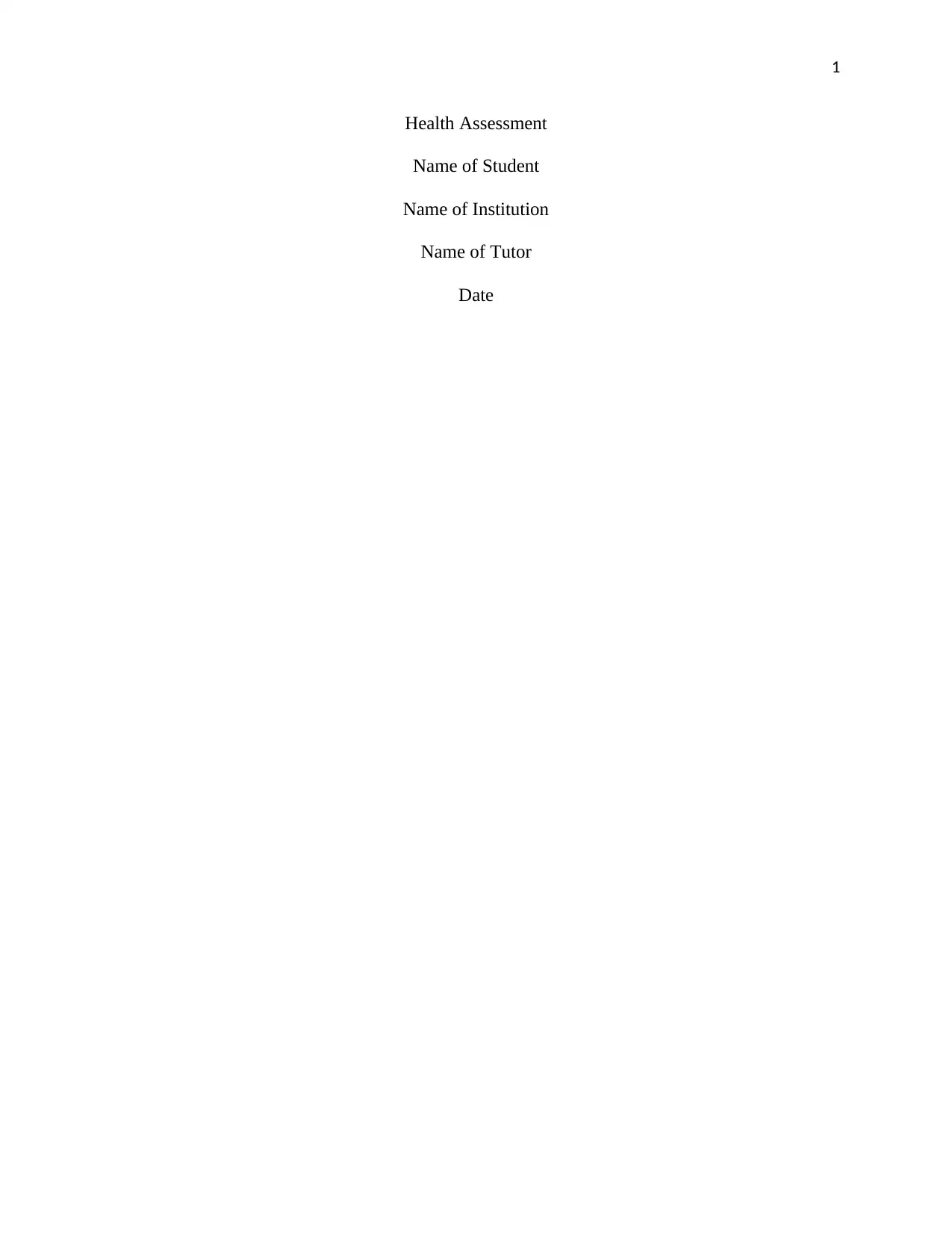
1
Health Assessment
Name of Student
Name of Institution
Name of Tutor
Date
Health Assessment
Name of Student
Name of Institution
Name of Tutor
Date
Paraphrase This Document
Need a fresh take? Get an instant paraphrase of this document with our AI Paraphraser
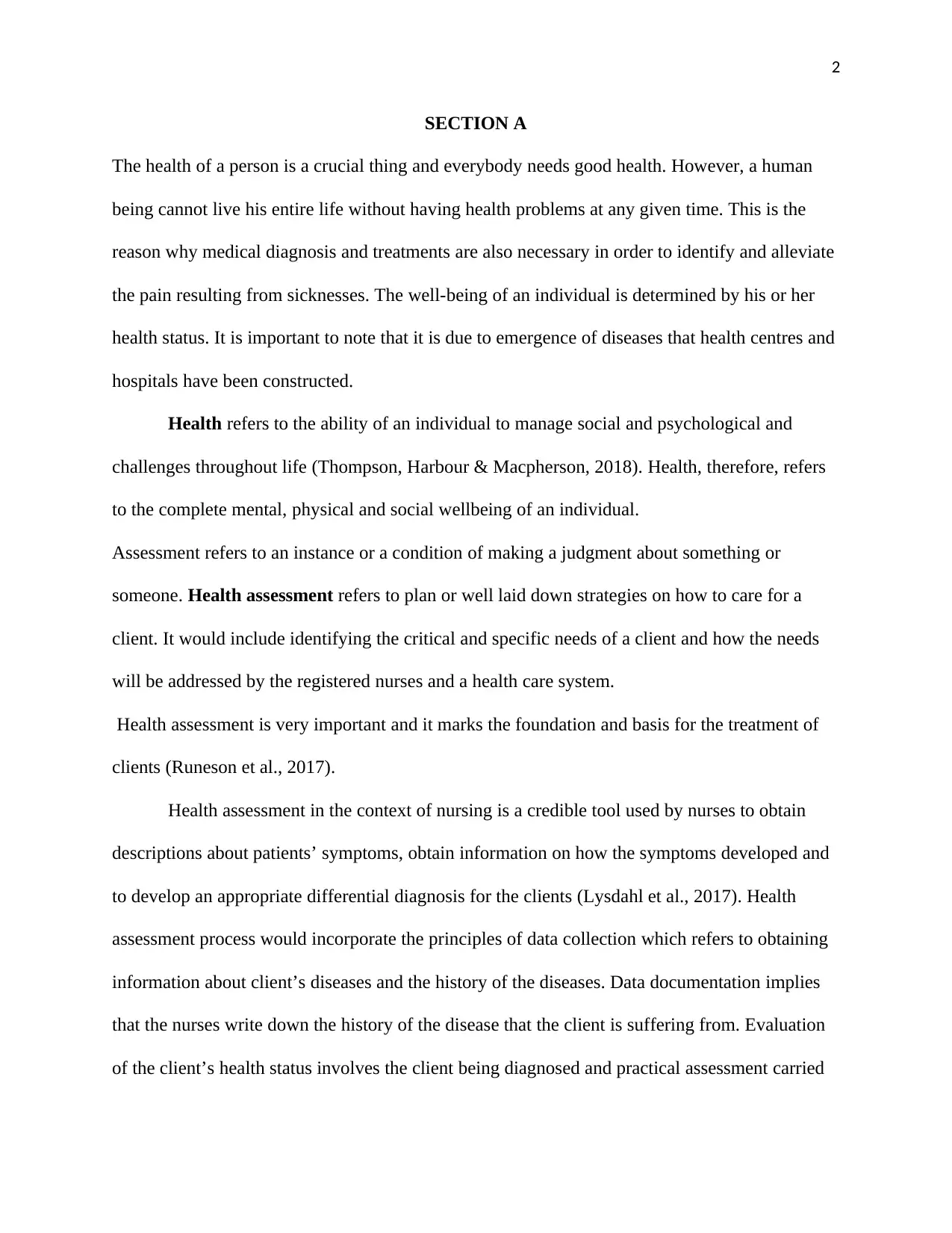
2
SECTION A
The health of a person is a crucial thing and everybody needs good health. However, a human
being cannot live his entire life without having health problems at any given time. This is the
reason why medical diagnosis and treatments are also necessary in order to identify and alleviate
the pain resulting from sicknesses. The well-being of an individual is determined by his or her
health status. It is important to note that it is due to emergence of diseases that health centres and
hospitals have been constructed.
Health refers to the ability of an individual to manage social and psychological and
challenges throughout life (Thompson, Harbour & Macpherson, 2018). Health, therefore, refers
to the complete mental, physical and social wellbeing of an individual.
Assessment refers to an instance or a condition of making a judgment about something or
someone. Health assessment refers to plan or well laid down strategies on how to care for a
client. It would include identifying the critical and specific needs of a client and how the needs
will be addressed by the registered nurses and a health care system.
Health assessment is very important and it marks the foundation and basis for the treatment of
clients (Runeson et al., 2017).
Health assessment in the context of nursing is a credible tool used by nurses to obtain
descriptions about patients’ symptoms, obtain information on how the symptoms developed and
to develop an appropriate differential diagnosis for the clients (Lysdahl et al., 2017). Health
assessment process would incorporate the principles of data collection which refers to obtaining
information about client’s diseases and the history of the diseases. Data documentation implies
that the nurses write down the history of the disease that the client is suffering from. Evaluation
of the client’s health status involves the client being diagnosed and practical assessment carried
SECTION A
The health of a person is a crucial thing and everybody needs good health. However, a human
being cannot live his entire life without having health problems at any given time. This is the
reason why medical diagnosis and treatments are also necessary in order to identify and alleviate
the pain resulting from sicknesses. The well-being of an individual is determined by his or her
health status. It is important to note that it is due to emergence of diseases that health centres and
hospitals have been constructed.
Health refers to the ability of an individual to manage social and psychological and
challenges throughout life (Thompson, Harbour & Macpherson, 2018). Health, therefore, refers
to the complete mental, physical and social wellbeing of an individual.
Assessment refers to an instance or a condition of making a judgment about something or
someone. Health assessment refers to plan or well laid down strategies on how to care for a
client. It would include identifying the critical and specific needs of a client and how the needs
will be addressed by the registered nurses and a health care system.
Health assessment is very important and it marks the foundation and basis for the treatment of
clients (Runeson et al., 2017).
Health assessment in the context of nursing is a credible tool used by nurses to obtain
descriptions about patients’ symptoms, obtain information on how the symptoms developed and
to develop an appropriate differential diagnosis for the clients (Lysdahl et al., 2017). Health
assessment process would incorporate the principles of data collection which refers to obtaining
information about client’s diseases and the history of the diseases. Data documentation implies
that the nurses write down the history of the disease that the client is suffering from. Evaluation
of the client’s health status involves the client being diagnosed and practical assessment carried
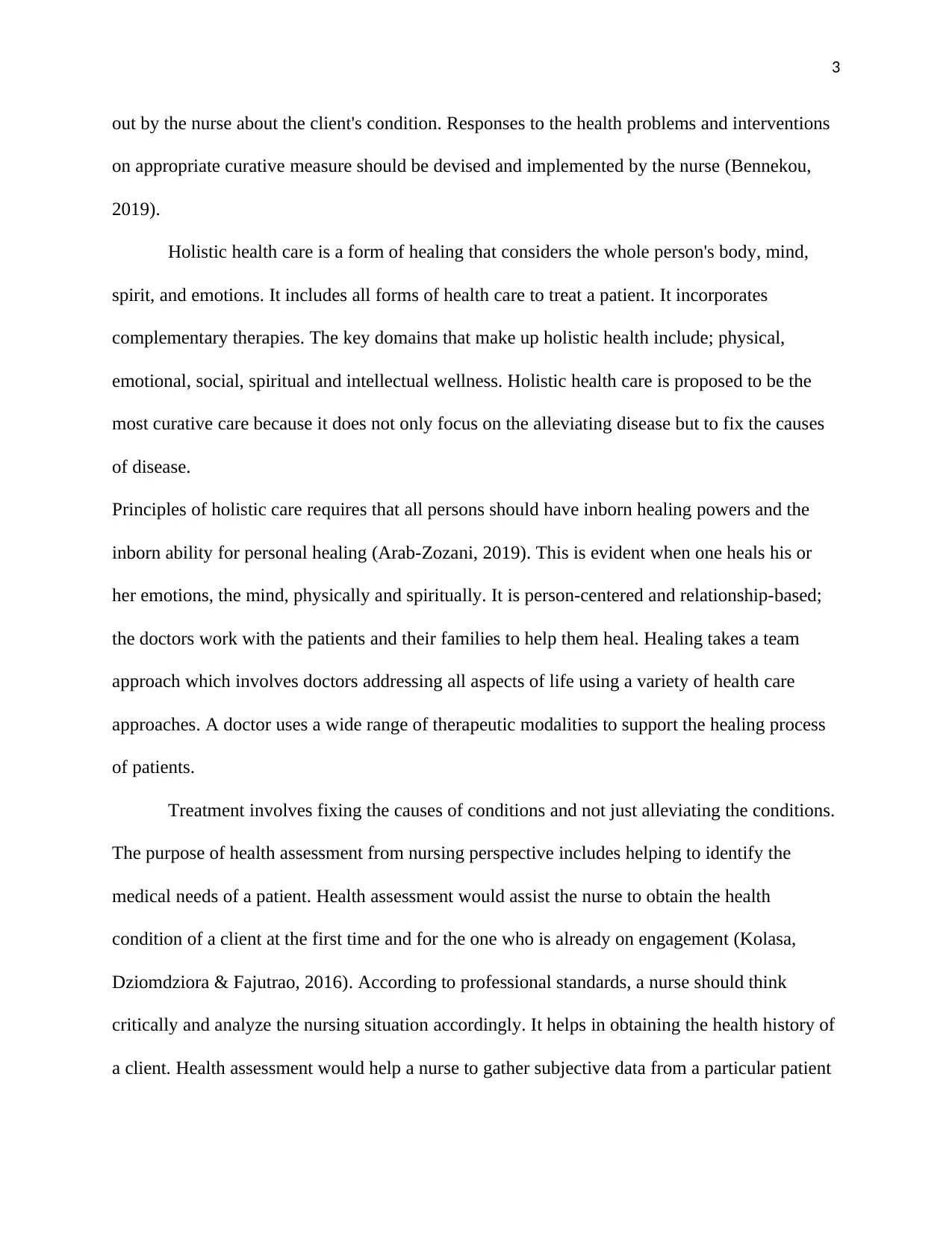
3
out by the nurse about the client's condition. Responses to the health problems and interventions
on appropriate curative measure should be devised and implemented by the nurse (Bennekou,
2019).
Holistic health care is a form of healing that considers the whole person's body, mind,
spirit, and emotions. It includes all forms of health care to treat a patient. It incorporates
complementary therapies. The key domains that make up holistic health include; physical,
emotional, social, spiritual and intellectual wellness. Holistic health care is proposed to be the
most curative care because it does not only focus on the alleviating disease but to fix the causes
of disease.
Principles of holistic care requires that all persons should have inborn healing powers and the
inborn ability for personal healing (Arab-Zozani, 2019). This is evident when one heals his or
her emotions, the mind, physically and spiritually. It is person-centered and relationship-based;
the doctors work with the patients and their families to help them heal. Healing takes a team
approach which involves doctors addressing all aspects of life using a variety of health care
approaches. A doctor uses a wide range of therapeutic modalities to support the healing process
of patients.
Treatment involves fixing the causes of conditions and not just alleviating the conditions.
The purpose of health assessment from nursing perspective includes helping to identify the
medical needs of a patient. Health assessment would assist the nurse to obtain the health
condition of a client at the first time and for the one who is already on engagement (Kolasa,
Dziomdziora & Fajutrao, 2016). According to professional standards, a nurse should think
critically and analyze the nursing situation accordingly. It helps in obtaining the health history of
a client. Health assessment would help a nurse to gather subjective data from a particular patient
out by the nurse about the client's condition. Responses to the health problems and interventions
on appropriate curative measure should be devised and implemented by the nurse (Bennekou,
2019).
Holistic health care is a form of healing that considers the whole person's body, mind,
spirit, and emotions. It includes all forms of health care to treat a patient. It incorporates
complementary therapies. The key domains that make up holistic health include; physical,
emotional, social, spiritual and intellectual wellness. Holistic health care is proposed to be the
most curative care because it does not only focus on the alleviating disease but to fix the causes
of disease.
Principles of holistic care requires that all persons should have inborn healing powers and the
inborn ability for personal healing (Arab-Zozani, 2019). This is evident when one heals his or
her emotions, the mind, physically and spiritually. It is person-centered and relationship-based;
the doctors work with the patients and their families to help them heal. Healing takes a team
approach which involves doctors addressing all aspects of life using a variety of health care
approaches. A doctor uses a wide range of therapeutic modalities to support the healing process
of patients.
Treatment involves fixing the causes of conditions and not just alleviating the conditions.
The purpose of health assessment from nursing perspective includes helping to identify the
medical needs of a patient. Health assessment would assist the nurse to obtain the health
condition of a client at the first time and for the one who is already on engagement (Kolasa,
Dziomdziora & Fajutrao, 2016). According to professional standards, a nurse should think
critically and analyze the nursing situation accordingly. It helps in obtaining the health history of
a client. Health assessment would help a nurse to gather subjective data from a particular patient
⊘ This is a preview!⊘
Do you want full access?
Subscribe today to unlock all pages.

Trusted by 1+ million students worldwide
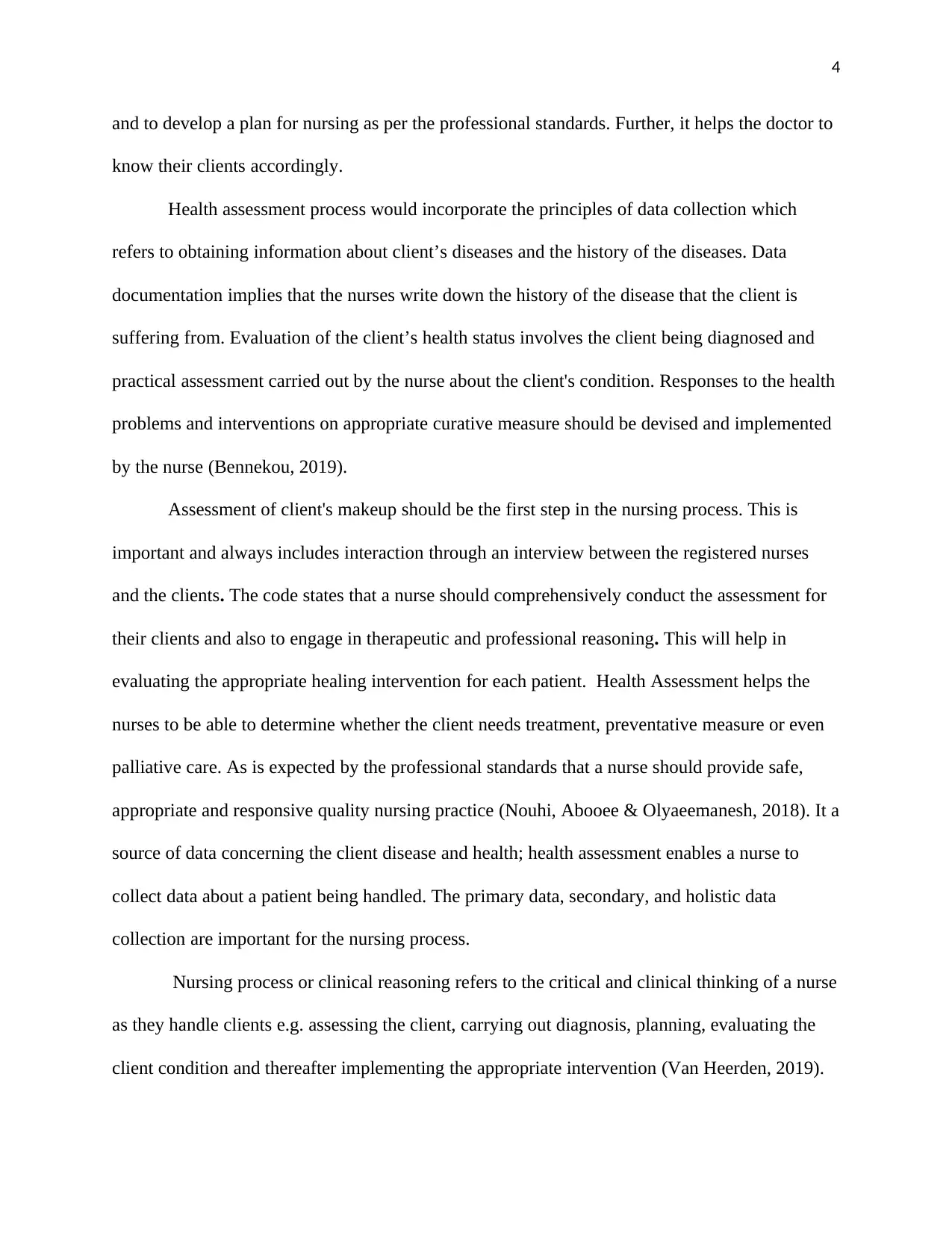
4
and to develop a plan for nursing as per the professional standards. Further, it helps the doctor to
know their clients accordingly.
Health assessment process would incorporate the principles of data collection which
refers to obtaining information about client’s diseases and the history of the diseases. Data
documentation implies that the nurses write down the history of the disease that the client is
suffering from. Evaluation of the client’s health status involves the client being diagnosed and
practical assessment carried out by the nurse about the client's condition. Responses to the health
problems and interventions on appropriate curative measure should be devised and implemented
by the nurse (Bennekou, 2019).
Assessment of client's makeup should be the first step in the nursing process. This is
important and always includes interaction through an interview between the registered nurses
and the clients. The code states that a nurse should comprehensively conduct the assessment for
their clients and also to engage in therapeutic and professional reasoning. This will help in
evaluating the appropriate healing intervention for each patient. Health Assessment helps the
nurses to be able to determine whether the client needs treatment, preventative measure or even
palliative care. As is expected by the professional standards that a nurse should provide safe,
appropriate and responsive quality nursing practice (Nouhi, Abooee & Olyaeemanesh, 2018). It a
source of data concerning the client disease and health; health assessment enables a nurse to
collect data about a patient being handled. The primary data, secondary, and holistic data
collection are important for the nursing process.
Nursing process or clinical reasoning refers to the critical and clinical thinking of a nurse
as they handle clients e.g. assessing the client, carrying out diagnosis, planning, evaluating the
client condition and thereafter implementing the appropriate intervention (Van Heerden, 2019).
and to develop a plan for nursing as per the professional standards. Further, it helps the doctor to
know their clients accordingly.
Health assessment process would incorporate the principles of data collection which
refers to obtaining information about client’s diseases and the history of the diseases. Data
documentation implies that the nurses write down the history of the disease that the client is
suffering from. Evaluation of the client’s health status involves the client being diagnosed and
practical assessment carried out by the nurse about the client's condition. Responses to the health
problems and interventions on appropriate curative measure should be devised and implemented
by the nurse (Bennekou, 2019).
Assessment of client's makeup should be the first step in the nursing process. This is
important and always includes interaction through an interview between the registered nurses
and the clients. The code states that a nurse should comprehensively conduct the assessment for
their clients and also to engage in therapeutic and professional reasoning. This will help in
evaluating the appropriate healing intervention for each patient. Health Assessment helps the
nurses to be able to determine whether the client needs treatment, preventative measure or even
palliative care. As is expected by the professional standards that a nurse should provide safe,
appropriate and responsive quality nursing practice (Nouhi, Abooee & Olyaeemanesh, 2018). It a
source of data concerning the client disease and health; health assessment enables a nurse to
collect data about a patient being handled. The primary data, secondary, and holistic data
collection are important for the nursing process.
Nursing process or clinical reasoning refers to the critical and clinical thinking of a nurse
as they handle clients e.g. assessing the client, carrying out diagnosis, planning, evaluating the
client condition and thereafter implementing the appropriate intervention (Van Heerden, 2019).
Paraphrase This Document
Need a fresh take? Get an instant paraphrase of this document with our AI Paraphraser
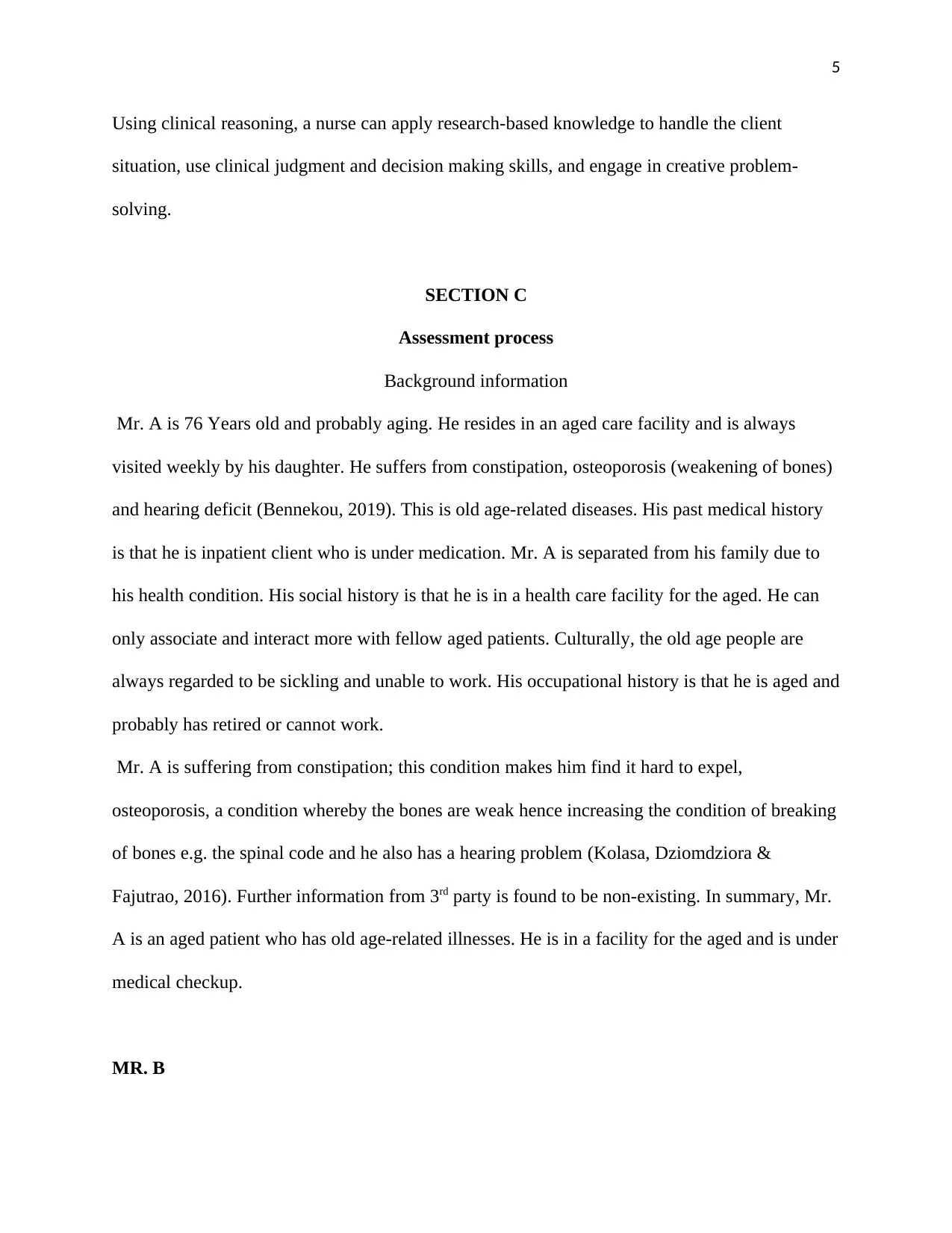
5
Using clinical reasoning, a nurse can apply research-based knowledge to handle the client
situation, use clinical judgment and decision making skills, and engage in creative problem-
solving.
SECTION C
Assessment process
Background information
Mr. A is 76 Years old and probably aging. He resides in an aged care facility and is always
visited weekly by his daughter. He suffers from constipation, osteoporosis (weakening of bones)
and hearing deficit (Bennekou, 2019). This is old age-related diseases. His past medical history
is that he is inpatient client who is under medication. Mr. A is separated from his family due to
his health condition. His social history is that he is in a health care facility for the aged. He can
only associate and interact more with fellow aged patients. Culturally, the old age people are
always regarded to be sickling and unable to work. His occupational history is that he is aged and
probably has retired or cannot work.
Mr. A is suffering from constipation; this condition makes him find it hard to expel,
osteoporosis, a condition whereby the bones are weak hence increasing the condition of breaking
of bones e.g. the spinal code and he also has a hearing problem (Kolasa, Dziomdziora &
Fajutrao, 2016). Further information from 3rd party is found to be non-existing. In summary, Mr.
A is an aged patient who has old age-related illnesses. He is in a facility for the aged and is under
medical checkup.
MR. B
Using clinical reasoning, a nurse can apply research-based knowledge to handle the client
situation, use clinical judgment and decision making skills, and engage in creative problem-
solving.
SECTION C
Assessment process
Background information
Mr. A is 76 Years old and probably aging. He resides in an aged care facility and is always
visited weekly by his daughter. He suffers from constipation, osteoporosis (weakening of bones)
and hearing deficit (Bennekou, 2019). This is old age-related diseases. His past medical history
is that he is inpatient client who is under medication. Mr. A is separated from his family due to
his health condition. His social history is that he is in a health care facility for the aged. He can
only associate and interact more with fellow aged patients. Culturally, the old age people are
always regarded to be sickling and unable to work. His occupational history is that he is aged and
probably has retired or cannot work.
Mr. A is suffering from constipation; this condition makes him find it hard to expel,
osteoporosis, a condition whereby the bones are weak hence increasing the condition of breaking
of bones e.g. the spinal code and he also has a hearing problem (Kolasa, Dziomdziora &
Fajutrao, 2016). Further information from 3rd party is found to be non-existing. In summary, Mr.
A is an aged patient who has old age-related illnesses. He is in a facility for the aged and is under
medical checkup.
MR. B
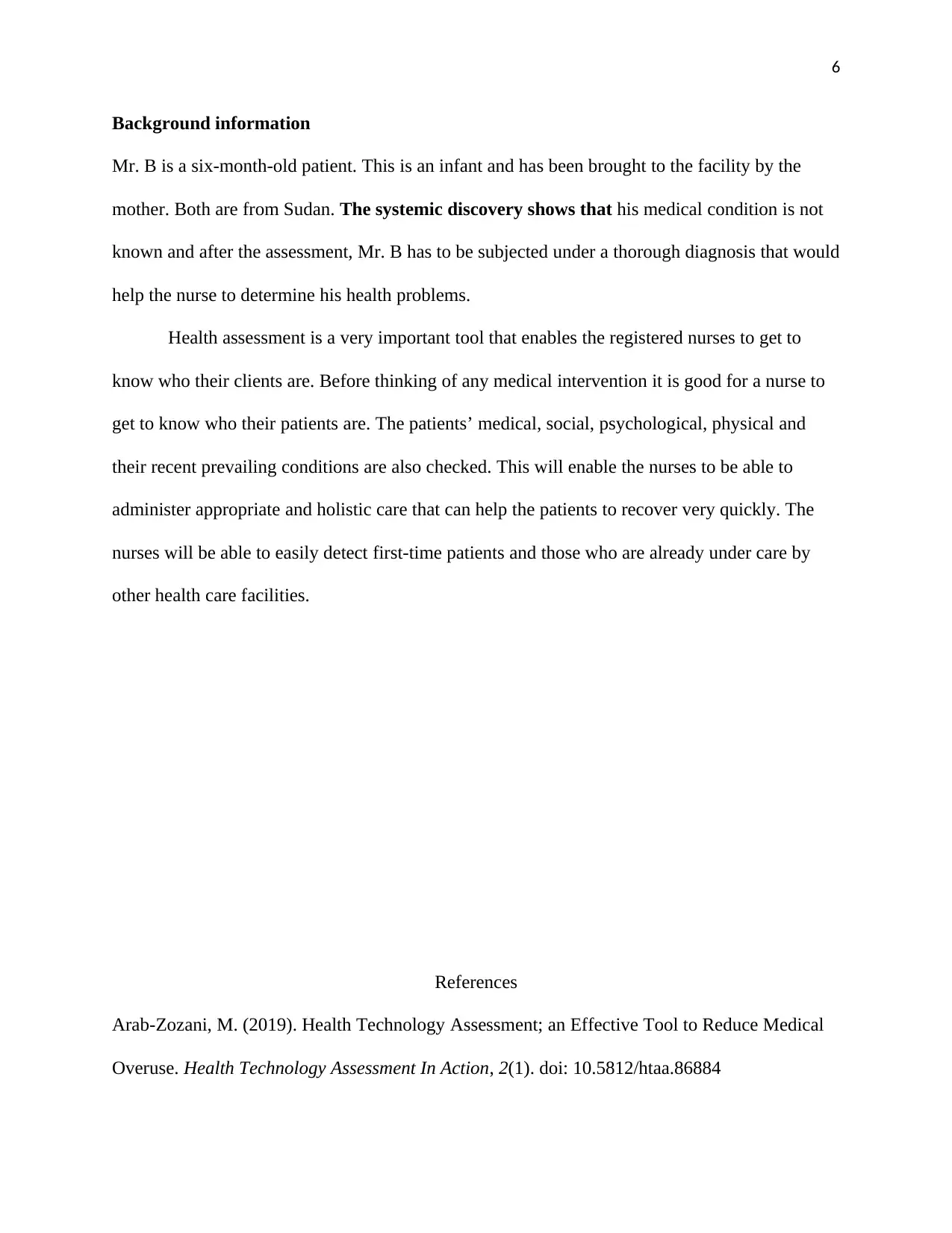
6
Background information
Mr. B is a six-month-old patient. This is an infant and has been brought to the facility by the
mother. Both are from Sudan. The systemic discovery shows that his medical condition is not
known and after the assessment, Mr. B has to be subjected under a thorough diagnosis that would
help the nurse to determine his health problems.
Health assessment is a very important tool that enables the registered nurses to get to
know who their clients are. Before thinking of any medical intervention it is good for a nurse to
get to know who their patients are. The patients’ medical, social, psychological, physical and
their recent prevailing conditions are also checked. This will enable the nurses to be able to
administer appropriate and holistic care that can help the patients to recover very quickly. The
nurses will be able to easily detect first-time patients and those who are already under care by
other health care facilities.
References
Arab-Zozani, M. (2019). Health Technology Assessment; an Effective Tool to Reduce Medical
Overuse. Health Technology Assessment In Action, 2(1). doi: 10.5812/htaa.86884
Background information
Mr. B is a six-month-old patient. This is an infant and has been brought to the facility by the
mother. Both are from Sudan. The systemic discovery shows that his medical condition is not
known and after the assessment, Mr. B has to be subjected under a thorough diagnosis that would
help the nurse to determine his health problems.
Health assessment is a very important tool that enables the registered nurses to get to
know who their clients are. Before thinking of any medical intervention it is good for a nurse to
get to know who their patients are. The patients’ medical, social, psychological, physical and
their recent prevailing conditions are also checked. This will enable the nurses to be able to
administer appropriate and holistic care that can help the patients to recover very quickly. The
nurses will be able to easily detect first-time patients and those who are already under care by
other health care facilities.
References
Arab-Zozani, M. (2019). Health Technology Assessment; an Effective Tool to Reduce Medical
Overuse. Health Technology Assessment In Action, 2(1). doi: 10.5812/htaa.86884
⊘ This is a preview!⊘
Do you want full access?
Subscribe today to unlock all pages.

Trusted by 1+ million students worldwide
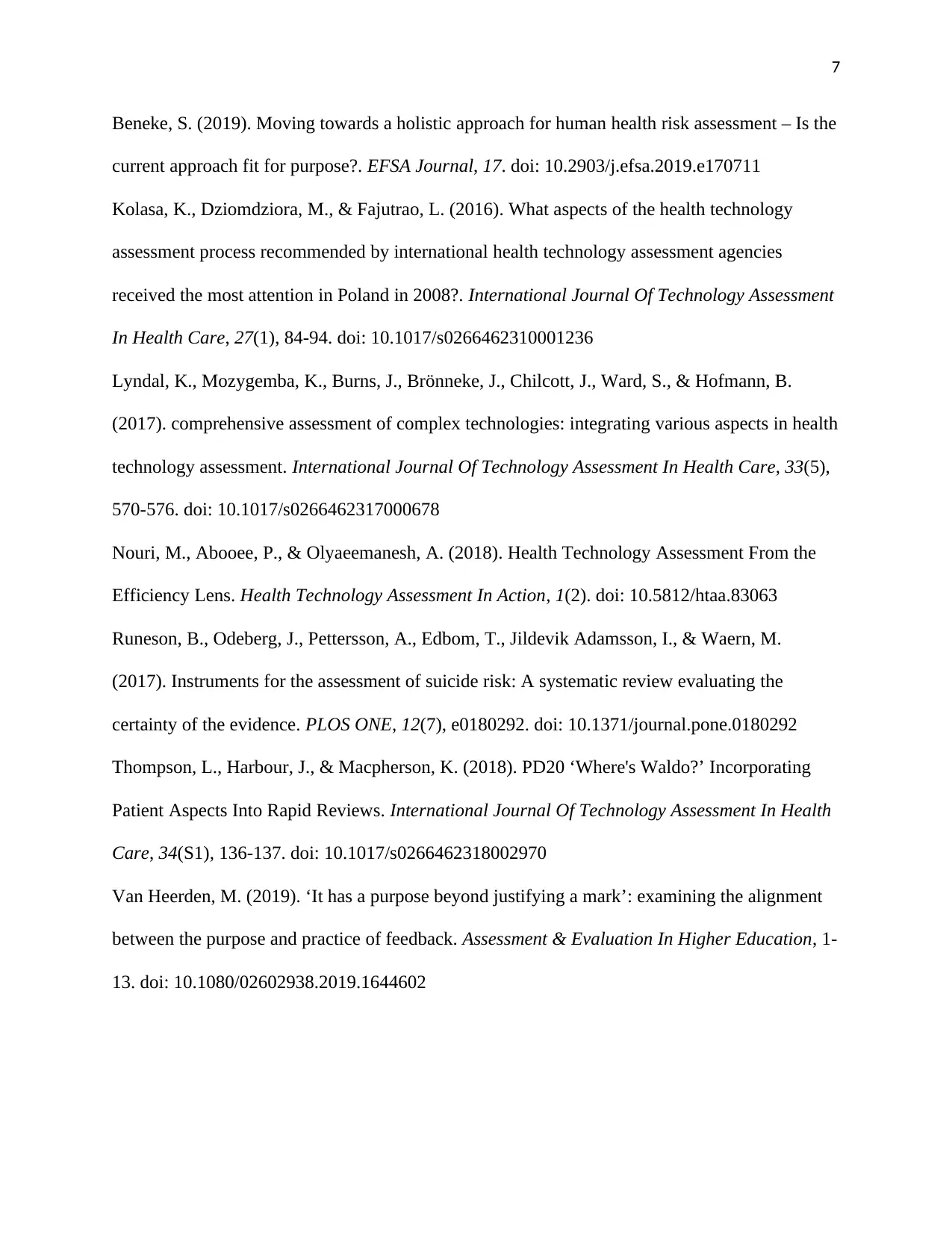
7
Beneke, S. (2019). Moving towards a holistic approach for human health risk assessment – Is the
current approach fit for purpose?. EFSA Journal, 17. doi: 10.2903/j.efsa.2019.e170711
Kolasa, K., Dziomdziora, M., & Fajutrao, L. (2016). What aspects of the health technology
assessment process recommended by international health technology assessment agencies
received the most attention in Poland in 2008?. International Journal Of Technology Assessment
In Health Care, 27(1), 84-94. doi: 10.1017/s0266462310001236
Lyndal, K., Mozygemba, K., Burns, J., Brönneke, J., Chilcott, J., Ward, S., & Hofmann, B.
(2017). comprehensive assessment of complex technologies: integrating various aspects in health
technology assessment. International Journal Of Technology Assessment In Health Care, 33(5),
570-576. doi: 10.1017/s0266462317000678
Nouri, M., Abooee, P., & Olyaeemanesh, A. (2018). Health Technology Assessment From the
Efficiency Lens. Health Technology Assessment In Action, 1(2). doi: 10.5812/htaa.83063
Runeson, B., Odeberg, J., Pettersson, A., Edbom, T., Jildevik Adamsson, I., & Waern, M.
(2017). Instruments for the assessment of suicide risk: A systematic review evaluating the
certainty of the evidence. PLOS ONE, 12(7), e0180292. doi: 10.1371/journal.pone.0180292
Thompson, L., Harbour, J., & Macpherson, K. (2018). PD20 ‘Where's Waldo?’ Incorporating
Patient Aspects Into Rapid Reviews. International Journal Of Technology Assessment In Health
Care, 34(S1), 136-137. doi: 10.1017/s0266462318002970
Van Heerden, M. (2019). ‘It has a purpose beyond justifying a mark’: examining the alignment
between the purpose and practice of feedback. Assessment & Evaluation In Higher Education, 1-
13. doi: 10.1080/02602938.2019.1644602
Beneke, S. (2019). Moving towards a holistic approach for human health risk assessment – Is the
current approach fit for purpose?. EFSA Journal, 17. doi: 10.2903/j.efsa.2019.e170711
Kolasa, K., Dziomdziora, M., & Fajutrao, L. (2016). What aspects of the health technology
assessment process recommended by international health technology assessment agencies
received the most attention in Poland in 2008?. International Journal Of Technology Assessment
In Health Care, 27(1), 84-94. doi: 10.1017/s0266462310001236
Lyndal, K., Mozygemba, K., Burns, J., Brönneke, J., Chilcott, J., Ward, S., & Hofmann, B.
(2017). comprehensive assessment of complex technologies: integrating various aspects in health
technology assessment. International Journal Of Technology Assessment In Health Care, 33(5),
570-576. doi: 10.1017/s0266462317000678
Nouri, M., Abooee, P., & Olyaeemanesh, A. (2018). Health Technology Assessment From the
Efficiency Lens. Health Technology Assessment In Action, 1(2). doi: 10.5812/htaa.83063
Runeson, B., Odeberg, J., Pettersson, A., Edbom, T., Jildevik Adamsson, I., & Waern, M.
(2017). Instruments for the assessment of suicide risk: A systematic review evaluating the
certainty of the evidence. PLOS ONE, 12(7), e0180292. doi: 10.1371/journal.pone.0180292
Thompson, L., Harbour, J., & Macpherson, K. (2018). PD20 ‘Where's Waldo?’ Incorporating
Patient Aspects Into Rapid Reviews. International Journal Of Technology Assessment In Health
Care, 34(S1), 136-137. doi: 10.1017/s0266462318002970
Van Heerden, M. (2019). ‘It has a purpose beyond justifying a mark’: examining the alignment
between the purpose and practice of feedback. Assessment & Evaluation In Higher Education, 1-
13. doi: 10.1080/02602938.2019.1644602
1 out of 7
Related Documents
Your All-in-One AI-Powered Toolkit for Academic Success.
+13062052269
info@desklib.com
Available 24*7 on WhatsApp / Email
![[object Object]](/_next/static/media/star-bottom.7253800d.svg)
Unlock your academic potential
Copyright © 2020–2026 A2Z Services. All Rights Reserved. Developed and managed by ZUCOL.





